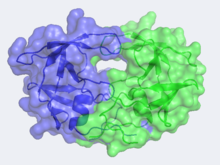We apologize for Proteopedia being slow to respond. For the past two years, a new implementation of Proteopedia has been being built. Soon, it will replace this 18-year old system. All existing content will be moved to the new system at a date that will be announced here.
User:David Canner/Sandbox HIV
From Proteopedia
(Difference between revisions)
| Line 6: | Line 6: | ||
===Medical Implications=== | ===Medical Implications=== | ||
| - | There currently is no cure or vaccine against contracting HIV. AIDS researchers, however, have discovered treatments that can slow progression of the HIV virus, thanks in large part to our understanding of the structure of HIV-1 protease. <scene name='User:David_Canner/Sandbox_HIV/Saquinavir/4'>Saquinavir</scene> was the the first protease inhibitor approved by the FDA for the treatment of HIV. It inhibits HIV-1 protease by <scene name='User:David_Canner/Sandbox_HIV/Saquinavir_tunnel/1'>binding tightly to the active site tunnel</scene>, preventing nascent peptides from entering and <scene name='User:David_Canner/Sandbox_HIV/Saquinavir_cat/1'>interfering with the catalytic triad</scene>.<ref>PMID:17243183</ref> Saquinavir effectively acts like an uncleavable ligand, highlighted by the protease flaps undergoing <scene name='User:David_Canner/Sandbox_HIV/Hiv_morph2/9'>a similar movement</scene> upon binding. Other drugs used to treat patients infected with the HIV virus which inhibit <scene name='User:David_Canner/Sandbox_HIV/Inhibitor_intro/1'>HIV-1 Protease</scene> include <scene name='User:David_Canner/Sandbox_HIV/Indinavir/2'>Indinavir </scene> ([[1hsg]]), <scene name='User:David_Canner/Sandbox_HIV/Ritonavir/1'>Ritonavir</scene> ([[1hxw]]), and Nelfinavir ( | + | There currently is no cure or vaccine against contracting HIV. AIDS researchers, however, have discovered treatments that can slow progression of the HIV virus, thanks in large part to our understanding of the structure of HIV-1 protease. <scene name='User:David_Canner/Sandbox_HIV/Saquinavir/4'>Saquinavir</scene> was the the first protease inhibitor approved by the FDA for the treatment of HIV. It inhibits HIV-1 protease by <scene name='User:David_Canner/Sandbox_HIV/Saquinavir_tunnel/1'>binding tightly to the active site tunnel</scene>, preventing nascent peptides from entering and <scene name='User:David_Canner/Sandbox_HIV/Saquinavir_cat/1'>interfering with the catalytic triad</scene>.<ref>PMID:17243183</ref> Saquinavir effectively acts like an uncleavable ligand, highlighted by the protease flaps undergoing <scene name='User:David_Canner/Sandbox_HIV/Hiv_morph2/9'>a similar movement</scene> upon binding. Other drugs used to treat patients infected with the HIV virus which inhibit <scene name='User:David_Canner/Sandbox_HIV/Inhibitor_intro/1'>HIV-1 Protease</scene> include <scene name='User:David_Canner/Sandbox_HIV/Indinavir/2'>Indinavir </scene> ([[1hsg]]), <scene name='User:David_Canner/Sandbox_HIV/Ritonavir/1'>Ritonavir</scene> ([[1hxw]]), and <scene name='User:David_Canner/Sandbox_HIV/Nelfinavir/2'>Nelfinavir</scene> ([[1ohr]]). |
__NOEDITSECTION__ | __NOEDITSECTION__ | ||
__NOTOC__ | __NOTOC__ | ||
Revision as of 16:22, 24 November 2010
| |||||||||||
Additional Resources
For additional information, see: Human Immunodeficiency Virus
References
- ↑ Spinelli S, Liu QZ, Alzari PM, Hirel PH, Poljak RJ. The three-dimensional structure of the aspartyl protease from the HIV-1 isolate BRU. Biochimie. 1991 Nov;73(11):1391-6. PMID:1799632
- ↑ Tie Y, Kovalevsky AY, Boross P, Wang YF, Ghosh AK, Tozser J, Harrison RW, Weber IT. Atomic resolution crystal structures of HIV-1 protease and mutants V82A and I84V with saquinavir. Proteins. 2007 Apr 1;67(1):232-42. PMID:17243183 doi:10.1002/prot.21304

